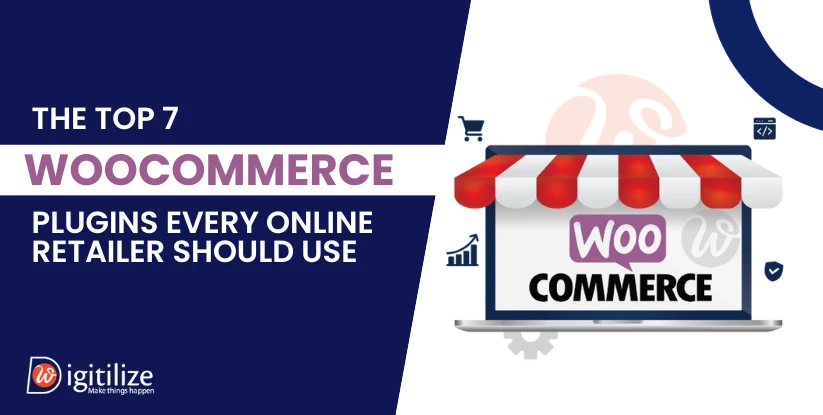The Top 7 WooCommerce Plugins Every Online Retailer Should Use
 With its many features and customizable choices, WooCommerce is an excellent platform for almost any type of eCommerce store. WooCommerce allows ecommerce businesses to use several platforms or use it alone to achieve amazing results. So, we need to know the top 7 WooCommerce plugins every online retailer should use.
Having said that, WooCommerce performs best when paired with other plugins that bring new functionalities. The plugin ecosystem for WooCommerce is quite active and offers possibilities for almost every aspect of the website. DigitilizeWeb’s goal is to provide you with a thorough overview of the top WooCommerce plugins for the year 2023. Regardless of whether you’re a seasoned professional attempting to keep ahead of the competition or a novice business owner aiming to improve your store. Hence, you can select the ideal plugins for your store’s requirements with the aid of this list.
With its many features and customizable choices, WooCommerce is an excellent platform for almost any type of eCommerce store. WooCommerce allows ecommerce businesses to use several platforms or use it alone to achieve amazing results. So, we need to know the top 7 WooCommerce plugins every online retailer should use.
Having said that, WooCommerce performs best when paired with other plugins that bring new functionalities. The plugin ecosystem for WooCommerce is quite active and offers possibilities for almost every aspect of the website. DigitilizeWeb’s goal is to provide you with a thorough overview of the top WooCommerce plugins for the year 2023. Regardless of whether you’re a seasoned professional attempting to keep ahead of the competition or a novice business owner aiming to improve your store. Hence, you can select the ideal plugins for your store’s requirements with the aid of this list.
Top 7 WooCommerce Plugins Every Online Retailer Should Use
-
Elementor
Features
- Adaptable themes and templates
- Drag-and-drop page constructor
- Responsive designs for mobile
- Widgets unique to woocommerce
- Capability for dynamic content
-
WooCommerce product filter
Features
- Adaptable filters
- Horizontal and vertical layouts
- Filtering by multiple attributes
- Filters for price ranges
-
OptinMonster
 With the use of pop-ups, OptinMonster can assist you in increasing sales. Nevertheless, it’s not your typical pop-up creator. With all of OptinMonster’s features, you’ll be amazed at how inventive you can be. As seasoned marketing experts can attest, combining OptinMonster with proper design principles may quickly bring about a ton of delighted, converting consumers.
With the use of pop-ups, OptinMonster can assist you in increasing sales. Nevertheless, it’s not your typical pop-up creator. With all of OptinMonster’s features, you’ll be amazed at how inventive you can be. As seasoned marketing experts can attest, combining OptinMonster with proper design principles may quickly bring about a ton of delighted, converting consumers.
Features
- Adaptable pop-up patterns
- Pop-up game development
- Page-by-page tracking
- Detection of user intent
- Targeting geolocation
-
WooCommerce Variation Swatches and Photos
Features
- Swatch/picture combinations
- Adaptable choices
- Design for mobile devices
- Shapes/color images
- Hover-zoom phenomenon
-
Product vendors by WooCommerce
Features
- Rates of commission that vary per vendor
- Personalized shipping costs
- Storefronts and goods unique to a vendor
- Commission declarations and reports
- Integration of PayPal Payouts
- Vendor registration and administration
- Tools for moderating marketplaces
- Ratings and reviews for products
-
Airlift
Features
- Lazy picture loading
- Minifying CSS, JS, and HTML
- Available with gzip compression and CDN integration
- Enabled browser caching
- Accessible database optimization
- Available code optimization
How do you pick your website’s top WooCommerce plugins?
 With so many WooCommerce plugins available, the following advice will help you select the ideal plugin for your online store:
With so many WooCommerce plugins available, the following advice will help you select the ideal plugin for your online store:
- Determine your unique requirements: Before selecting a plugin, determine the features and functions that are necessary for your online shop. Additionally, this will assist you in selecting a plugin that meets your unique requirements.
- Check the compatibility: Verify the plugin’s compatibility with the most recent version of WooCommerce and any other plugins you are using. Additionally, this will avert disputes and guarantee the seamless operation of your shop.
- Think about the price: Although free plugins are occasionally a decent choice, commercial plugins may provide more sophisticated functionality and support. So, prioritize your spending and weigh the benefits the plugin offers before choosing.
- Select trustworthy developers: Search for WooCommerce plugins created by trustworthy developers who have a track record of producing high-quality plugins.
- Think about performance impact: Prior to adding a plugin, think about how it will affect the functionality of your store. Hence, select plugins that won’t slow down your store and are optimized for speed.
FAQ
Frequently Asked Questions
WooCommerce works with many sites. This implies that the WooCommerce plugin will be active on all sites upon installation and activation and that you will have the ability to establish a shop and configure goods for every site inside the multisite. separately. Every store will function separately from the others.
Installing and uninstalling WooCommerce is similar to doing so with any other WordPress plugin. Another alternative step to assist with full setup is to fully install and configure WooCommerce on your website; this can be done using the Setup process.
WooCommerce is free and open source, much like WordPress security plugins. It is therefore entirely free for anybody to download, use, and edit even if it has a premium feel to it. Contact us to get both platform's services.
The goal of WooCommerce is to give e-commerce websites a secure and intuitive base. That being said, it is not immune to outside security risks like credit card skimmers, brute force assaults, hacking, and other malware.
With the help of the adaptable WooCommerce plugin, you can quickly and easily create an online store. You may quickly construct product, basket, and checkout pages using this tool. Along with accepting a range of payment ways, you may provide several delivery choices, such as free and flat-rate shipping. To know more contact us!
Shopify is widely seen as being easier to use than WooCommerce because of its simple and straightforward interface, which makes it simple for even non-technical users to set up and maintain their businesses.

